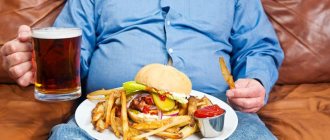At different times, ideals changed as quickly as the weather in spring. In my childhood, the most attractive children were considered to be those with “bandages” on their arms and legs, those who would now be called overweight children. The ideas of a slim figure, proper nutrition and exercise apply not only to the constantly losing weight of the mother, but also to the child.
Obesity has become the scourge of our time, which everyone is already tired of fighting, but nevertheless continues. But if an adult can close his mouth, hang a barn lock on the refrigerator, not buy various bakery delicacies, avoid fatty and carbohydrate-rich foods, then when it comes to our children, everything is not so simple. It's not always possible to get them to eat chicken breast and broccoli when they want fried potatoes and sausage.
Of course, obesity varies, but do not forget that a 10% deviation from the norm in weight is already obesity. If your weight begins to increase, but your lifestyle has not changed, then you need to consult a doctor; this may be a symptom of hormonal imbalance, metabolic disorders and other diseases.
chubby baby
If a child is overweight, then it is necessary to carefully monitor weight gain to avoid unpleasant consequences. You can correct the excessive gain by reviewing the menu, reducing caloric intake and increasing the baby’s activity.
Walking in the fresh air will be beneficial for both the child and the mother. Try to avoid empty products, the usefulness of which is zero, for example, instead of candy or cookies, offer your child fruit. On walks and playgrounds, you can often see children constantly chewing something, either small dry goods or bread, thus the child develops incorrect eating habits.
Overweight schoolboy
If your child is already a schoolchild, then, on the one hand, it is easier - because he already understands a lot, but on the other hand, it is more difficult, since he still does not have a strong enough will. Talk, help him find the cause of excess weight himself, and then come up with ways to solve this issue. Perhaps you decide to take the whole family to the pool and give up baking.
The morning in the family must begin with breakfast; choose tasty and satisfying dishes, this will help the child at school do without snacks. If there is a lot of school work and he is sure to get hungry, then give him a healthy second breakfast. Whether to give money to the school canteen or not is up to each parent to decide on their own, and it’s not about the money at all, but about the chips and crackers bought in the canteen. It is better if you have lunch and dinner at home, include a vegetable salad in each meal. It should be taken into account that even the healthiest food should be eaten at the dinner table, and not while watching TV.
Modern schoolchildren are very dependent on gadgets, and often, instead of walking or playing in the yard, they choose to spend all their free time at the computer or lying on the sofa with a tablet. Enroll your child in a team sport, such as football or volleyball. Firstly, new acquaintances will appear, secondly, sport disciplines you, and thirdly, physical activity will help you keep fit.
Try to spend more time together, devote it to physical activity: go for a family walk, take a ball with you. If the weather does not permit, you can do exercises to music or dance. Get a dog. Yes, yes, a dog! Let the child look after her, walk her, run with her. And the weight will be normalized, and the mood will always be high.
If the child is too fat: advice to parents
If your child is well-fed or even more fat, it’s time to think about how to correct the situation . Yes, by the standards of grandmothers, there should be a lot of good children. But in fact, excess baby weight is fraught with many health problems. A chubby, appetizing baby who touches with his big cheeks and heroic size, when he grows up, he will suffer from very serious diseases, such as
- high blood pressure,
- disruption of the nervous and cardiovascular systems,
- diabetes,
- fatty liver degeneration,
- cholelithiasis,
- pathologies of the reproductive system up to infertility,
- posture disorders,
- kidney diseases.
In addition, overweight children of school age and adolescence often suffer from ridicule of their peers, because, as we know, children are very cruel towards those who are different from the rest. As a result, the child develops a lot of complexes, difficulties in communicating with the opposite sex, and depression develops.
How to understand that a child is fat
It is sometimes very difficult for parents to realize that their wonderful child is too fat for his age. The situation becomes more complicated if all members of the family are quite well-fed, then obesity is considered the norm and even a sign of health, which is very wrong. Therefore, regarding the child’s weight, it is worth consulting with a pediatrician, who always has on hand tables of the weight of children of different ages.
Or you can try to calculate the average normal weight yourself. It is believed that children from 1 to 5 years old should gain an average of 2 kg per year. Thus, by the age of 5, the baby weighs on average 18-22 kg. The average normal body weight of a child 2-7 years old is calculated using the formula: M=10+2*n, where n is the child’s age in years.
Starting from the age of 10, 4 kg is considered normal annual weight gain. The average normal weight of a child can be calculated using the formula: M=30+4*(n – 10), where 30 is the average weight of a child at 10 years old, n is the child’s age.
Read also: The weight of a newborn depends on vitamin D
Why does a child gain excess weight?
There are several reasons why a baby gains extra pounds, but not all of them are equally common. According to nutritionists, only 1% of children are overweight due to heredity or pathology of the endocrine system.
In most cases, subjective reasons are to blame for obesity , such as:
- poor eating habits in the family;
- unhealthy sedentary lifestyle;
- passion for fast food, sweet carbonated drinks in combination with computer games and a sedentary lifestyle;
- the habit of eating away stress and problems that parents form, stopping the hysteria with candy;
- frequent and unhealthy snacks;
- irregular, unbalanced diet.
Read also: Excess weight in a child: reasons and advice for parents
The process of losing weight for a child should, of course, begin with a visit to a pediatrician, endocrinologist and nutritionist. It is important to accurately determine that excess weight is not the result of hormonal imbalances or malfunctions of the thyroid gland. And only after this can you begin to correct the diet and lifestyle, naturally, under the guidance of a nutritionist who will create the right diet for the child. After all, children should not adhere to strict “adult” diets, because this can harm their growth and development.
In addition, children may need the help of a psychologist to lose weight. Take a closer look at your child: is he eating away at school stress? Doesn't he use food to gain pleasure and compensate for the lack of communication with classmates and friends? Perhaps the child has a personal drama or an unhappy love?
Top 5 most dangerous foods for your figure and health
- Fast food and foods containing large amounts of carbohydrates.
- Food additives and flavor enhancers that deceive the taste buds and increase appetite.
- Juices from a package and sweet carbonated drinks, which not only do not quench thirst, but increase it and stimulate appetite, stimulating the production of hydrochloric acid in the stomach, which provokes gastritis and reflux disease.
- Candies, chocolate, various sweets.
- Yeast baked goods, white flour products, pasta, dumplings, dumplings.
Read also: PHOTOmig: what do families eat around the world?
Child and sweets: give or forbid?
Tatyana Polishchuk, a pediatrician of the first category, medical pediatric gastroenterologist, advises: “It is better to limit the consumption of sweets, especially if the child spends a lot of time sitting at the computer or lying on the sofa. The fact is that all carbohydrates contained in baked goods, cereals, and sweets ultimately turn into glucose. When glucose is used to cover energy costs during physical activity - walking, running, swimming, active games - then sweets do not harm. And if a child leads a sedentary lifestyle, excess sweets can lead to weight gain. It is not recommended to consume more than 5-8 tablespoons of sugar per day. If a child plays sports or prepares for exams, a sufficient amount of glucose and vitamins is needed - they will help cope with stress. During periods of extreme stress, fresh fruits, herbs, raisins, dried apricots, nuts and cocoa will help support the body.”
The famous gymnast Ekaterina Serebryanskaya on our forum shares her personal experience on how to feed a child: “Regarding cookies))) it is ideal to bake whole grain cookies with your own hands. This way you are absolutely sure of the quality of the products and the absence of chemicals. If you don’t have time (this, of course, is not an excuse)))), then choose whole grains. And at the same time, think before you give him a cookie: did my child eat 5 types of vegetables and fruits today? Maybe now is the time to peel a pear or peach and give real vitamins to my beloved, and eat it myself... And then, if he still wants it, I’ll give him a cookie. First, feed tasty and healthy..."
How to help your child lose weight: 8 right steps
1. Be patient and do not allow yourself to blame the child for being overweight, because excess weight is in most cases the fault of the parents.
2. Explain why it is important to change your diet - first of all, for health, and not for your figure. And don’t say: “You’re fat, you need to lose weight.”
3. Do not ban your favorite products, but choose a good replacement. Candies can be replaced with dried fruits, cookies with whole grain breads and fruits, sweet carbonated drinks with herbal teas, etc.
4. Show by personal example how to eat properly. If necessary, change the eating habits of the whole family: give up fatty and fried foods, switch to light vegetable soups, steamed dishes, cereals, low-fat dairy products, lean meats and fish. Limit harmful foods - pasta, sausages, sausages and other semi-finished products. Do not buy sweets and candies.
Read also: Recipe of the week. Dried fruit candies
5. Take care of healthy snacks - bring fresh vegetables and fruits, dried fruits, whole grain cookies, unroasted nuts, herbal teas to school. Always have a prepared but undressed vegetable salad in the refrigerator in case your child wants a snack.
6. Play sports with your child - choose your favorite sport and do it together. Support your child in their efforts to lose weight.
Read also: Getting your child used to playing sports: advice for parents
7. Arrange a competition: who will lose weight the fastest. To begin with, complain that you have gained a little weight and your favorite dress or jeans have become too small, so you need to do something urgently. Explain that you can’t cope without the child’s help.
8. Show patience and kindness - do not insult the child or ridicule his fatness. To be a real fellow sufferer called “overweight”.
Good luck to you and your child in the difficult task of losing weight! Let the children be healthy and beautiful!
Read also: The height of a child depends on the amount of money in the family
Banning sweets is a dangerous path
Many nutritionists advise completely eliminating sweets, but this is a double-edged sword. On the one hand, this will probably give its “weight loss” results, but for the child it can result in neurosis, or he will eat candy in secret from you.
There was a “fat” period in my life, from first to fourth grade. I wasn't bullied in class, but choosing clothes was a bit difficult. Mom removed all the sweets from the house, but, apparently, my resourcefulness knew no bounds, and I began to write off for candy, and intensively go to visit people so that they would treat me to something sweet. When sweets did appear during the holidays, I ate them in huge quantities, trying to fill myself up for future use. I can say that I grew up a long time ago, and I still struggle with this unpleasant habit.
Many experts say that sugar cravings and overeating are closely related to psychology. Perhaps the child eats grievances and tries to get feelings and emotions that he lacks through food.
What should parents of a teenager do?
If you see that your child has weight problems, be sure to support the decision to start losing weight. Do not buy sweets for tea at home, do not provoke breakdowns. Help with choosing clothes that will hide imperfections.
If, in your opinion, the problem of excess weight is far-fetched, suggest that he obtain objective data - calculate the body mass index (BMI) using the formula:
Weight: height2
(weight is taken in kilograms, height - in meters)
If the result obtained is in the range from 18 to 24, this is an index corresponding to normal weight. A BMI of 25 to 29 indicates overweight, and above 30 indicates obesity. A BMI below 18 is also an alarming symptom - this is low body weight, possibly anorexia.
Overweight children: how to determine whether a child is overweight and what parents should do about it
According to Svetlana Yurchik, her son Anton has always been overweight. At one year he weighed 13.5 kg and looked like a two-year-old.
“Friends always said: “He’s so plump.” I wasn’t offended; on the contrary, I looked at thin people as “undernourished,” recalls Svetlana.
Anton came to first grade without a jacket because Svetlana simply couldn’t find the right size. Buying clothes for Anton is always a problem. Svetlana buys trousers and jackets in departments for teenagers and adults, and then shortens them in length.
– Friends sometimes call Anton a sumo wrestler. Outwardly I take these words calmly, translate them as a joke, but inside I worry. I'm afraid that my son will remain fat. But no one likes fat people: children call them names, girls don’t look at them. And now I myself have a complex because my son is fat,” Svetlana sighs.
Mom constantly reminds Anton not to eat sandwiches at night and eat apples instead of buns at school. But during the holidays at his grandmother’s, he has a blast and again fills up his belly so much that he can’t fit into any of his trousers.
Overweight or obesity
“In medicine there are two concepts: “excess weight” and “obesity,” says Larisa Kislach, head of the 1st pediatric department of the Baranovichi Children’s Clinic. – Overweight means exceeding the standard weight. Obesity is a chronic disease in which pathological changes in metabolism occur.
Obesity can also be seen by a non-specialist: the child is larger than his peers, his arms, legs, stomach, hips and even his face are plump. Fat accumulates most intensively in infants under one year of age, in children aged 5–7 years and in adolescents 12–17 years old.
How to determine the degree of obesity
The degree of obesity is determined by a therapist or endocrinologist. The doctor measures the child's weight and height and compares it with normal weight standards for a certain age. They are contained in special tables called centiles. The indicators are different for boys and girls.
There are four degrees of obesity in children. I degree – excess body weight by 15–25%, II degree – by 26–50%, III degree – by 51–100%, IV degree – body weight is more than twice the norm.
The chest circumference, waist and hip circumference, and subcutaneous fat thickness are also taken into account. All data is summarized and a diagnosis is made.
Parents need to remember: at six months the child’s weight is twice as much as at birth, and at one year it triples. Subsequently, the annual weight gain is about 2 kg. During puberty, at 12–15 years, the increase can reach 5–8 kg per year.
Why do children get fat?
If the child is overweight, then excess weight may be due to a genetic or endocrine disease. Another reason may be the presence of psychological problems. For example, a child has no friends, his relatives do not understand him. He begins to “seize” problems by absorbing large amounts of food.
The third reason - the most common, according to Baranavichy doctors - is the incorrect nutrition system in the family and social stereotypes.
– Today it has become the norm when a schoolchild snacks on a bun, pizza or “boat” between classes. Instead of a full lunch at home, children are treated to dumplings from a bag, says Larisa Kislach.
The fourth reason for excess weight in children is inactivity. Schoolchildren spend more time at computers than outside. And some parents even refuse to allow their child to attend the sports section, believing that it is better to devote their free time to study.
What to do if the child is fat?
Elena Kutsko, endocrinologist at the Baranovichi Children's Clinic advises:
Go to an endocrinologist and pediatrician and, under their guidance, begin the fight against excess weight.
Start losing weight as a family. The example of adults will stimulate the child, it will be easier for him to stick to the diet “for company.”
Eat right: be sure to have breakfast, give up fried foods in favor of boiled and stewed foods, introduce more vegetables into your diet.
Choose a diet. The doctor will write out an approximate diet. It will take into account the child’s preferences, age, degree of physical activity and many other factors.
Get your child moving. Choose workouts based on his strengths and interests. Take walks and play outdoor games in the yard.
Get a pet that your child can walk with. Walking will increase calorie consumption and improve muscle tone.
Author: Yulia IVASHKO
Teasing and offensive nicknames
Many children are bullied at school and on the street because they are overweight. Pay attention to whether the child has friends and whether he is happy to talk about school. If complexes have already appeared, then your responsibility is not to leave your child alone with them.
When a child has the idea that he is fat and worse than others, parents should do everything possible to raise self-esteem and get rid of the problem. Always be there, support, advise. If you can’t cope on your own, be sure to consult a specialist, go to a psychologist, endocrinologist. Do not let your child’s obesity take its course, because health must be protected from a young age.
Who is considered fat?
During the regular medical examination of Moscow schoolchildren, all children who were found to be overweight or obese were asked to come to the appointment again, with their parents. Alas, only 20% of parents with children made this visit - the rest ignored the problem. Someone thought that with age the child would stretch out and lose weight.
Some people simply don’t notice their child’s extra pounds. As a result, in most cases, a teenager sees an endocrinologist when his weight exceeds 100 kg! At the same time, his medical record is literally covered by doctors, but the parents are firmly convinced: the child eats little, moves a lot - he goes to the sports section once a week, but for some reason he is getting plump. Probably something to do with hormones.
| Only numbers | |
| According to 2004 data, in Russia there are about 8% of obese children in cities and 4.5% in rural areas. This is comparable to European countries. In the United States, 17% of children are obese, and 34% are overweight. The lowest rates are in Japan and African countries. | |
Indeed, sometimes excess weight is associated with genetic diseases, when the child does not have a stop signal in food. But such cases are less than 1%. The reason for excess weight in the rest is family eating habits, lack of nutritional culture and hereditary predisposition. If one of the parents is fat, in 30% of cases the child will reach the same size. When both parents are overweight, the risk of obesity in a child reaches 60%. But even this situation is not fatal. The specificity of these genes is that they are well corrected by physical activity. There would be a desire.











